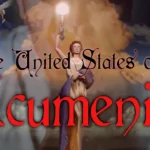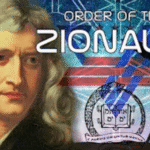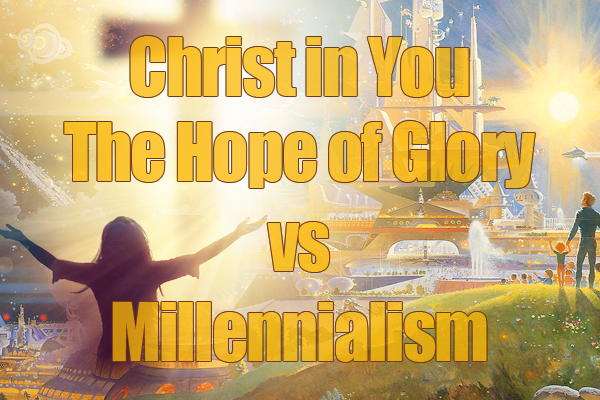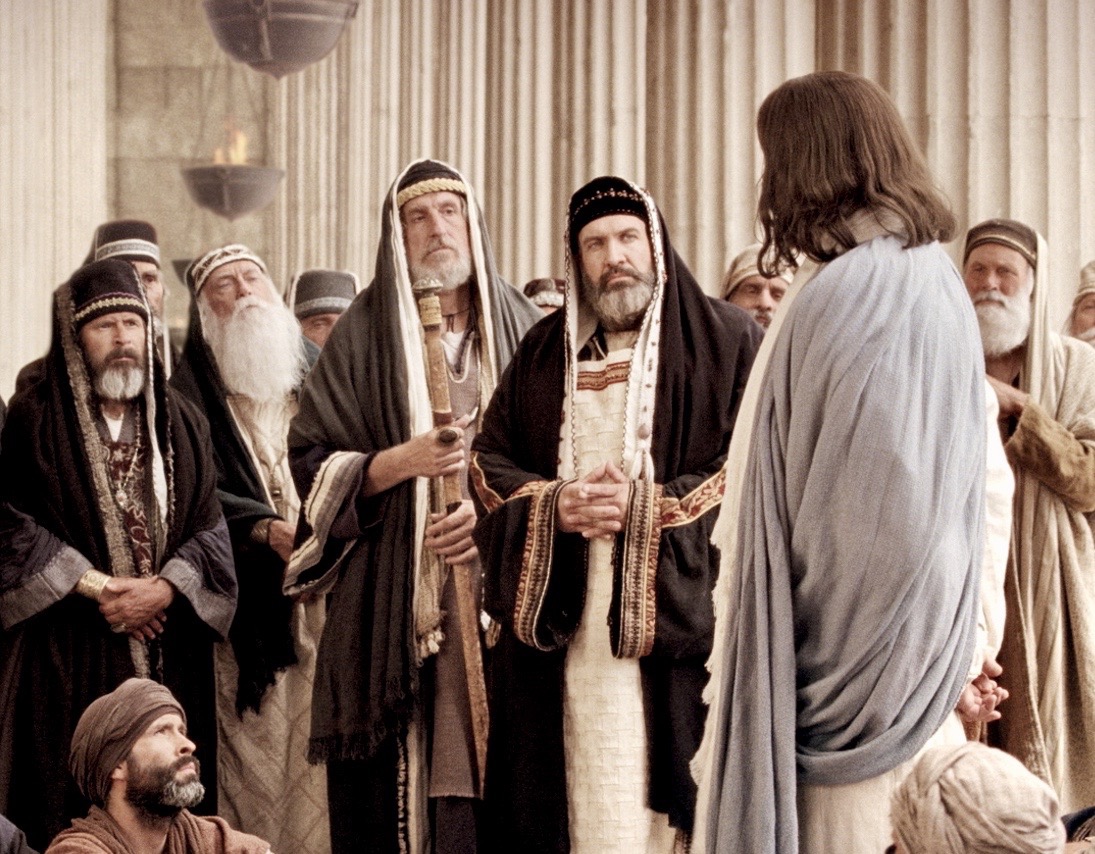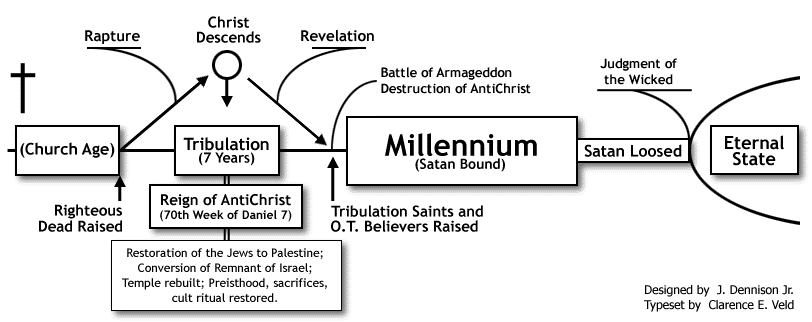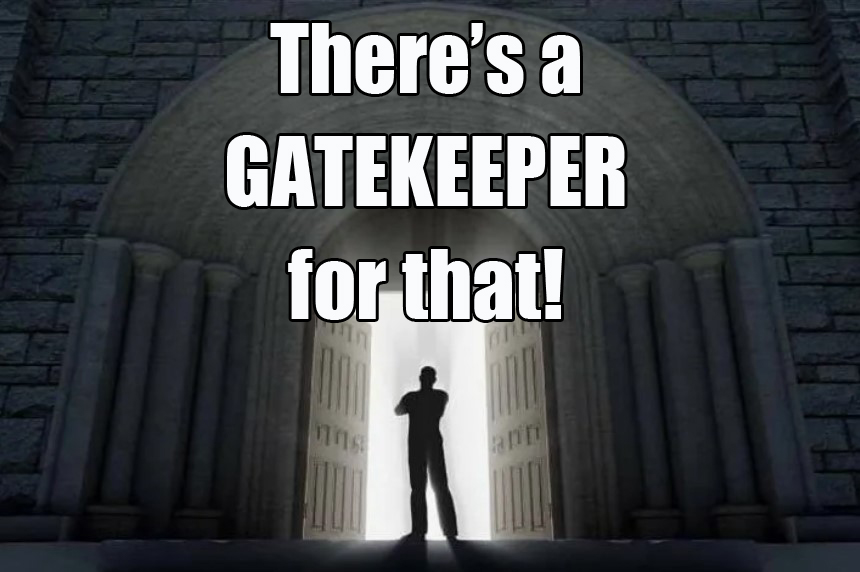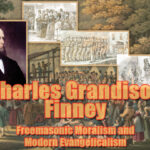He has delivered us from the domain of darkness and transferred us to the kingdom of his beloved Son, in whom we have redemption, the forgiveness of sins.
For by him all things were created, in heaven and on earth, visible and invisible, whether thrones or dominions or rulers or authorities—all things were created through him and for him…
I became a minister according to the stewardship from God that was given to me for you, to make the word of God fully known, the mystery hidden for ages and generations but now revealed to his saints. To them God chose to make known how great among the Gentiles are the riches of the glory of this mystery, which is Christ in you, the hope of glory. (Col 1:13-14;24-27)
The Mystery: Christ in you, the hope of glory!
“Christ in you, the hope of glory.” What hope could be greater? Do we even know, are we even cognizant of the miracle that’s been accomplished in us as born-in-spirit citizens of His kingdom? The world screams so loudly and is all the more intrusive since we’ve got Smart Phones. The brief morning scroll fixes our thoughts squarely on everything from mindless distractions to all that the devil is up to, complete with commentary by those who have a smattering of knowledge and think they know everything. But then comes that personal crisis; the death of someone we deeply love, the loss of a job, our home is foreclosed upon, or we get that cancer diagnosis, and suddenly we see it all for what it is; futility; hopelessness; noise.
Vanity of vanities, says the Preacher, vanity of vanities! All is vanity. What does man gain by all the toil at which he toils under the sun? (Ecc 1:1-3)
If there’s a loving God, then why is there pain in this world? Why do we grieve? The problem of evil finds its only answer in Christ. As Christians, we know that there’s pain in the world because it is hopelessly fallen, and that’s the reason He provided a means of escape through Jesus Christ. Even once we’re found in Him, pain and grief serve to remind us not to place our hope here.
For the creation was subjected to futility, not willingly, but because of him who subjected it, in hope. (Rom 8:20)
It is better to go to a house of mourning than to go to a house of feasting, for death is the destiny of everyone; the living should take this to heart. (Ecc. 7:4 NIV)
It isn’t in seasons of earthly ease and happiness that we draw near to Him, but in times of tribulation. It’s in this sense that we “rejoice in our tribulations.” (Rom 5:3) Contrary to the tragically misleading teachings of the “health and prosperity” ministries of our day, it is not a life of ease, but one of tribulation that marks the believer.
I, John, who also am your brother, and companion in tribulation, and in the kingdom and patience of Jesus Christ. (Rev 1:9)
I have said these things to you, that in me you may have peace. In the world you will have tribulation. But take heart; I have overcome the world (Jn 16:33)
How short-sighted it is to focus on earthly healing and carnal success rather than what God and His sweet presence may bring about through adversity! Yes, Jesus healed many people in his 3-1/2 year ministry, but while He does have great compassion on the sick, the purpose of those healings was to reveal that He was/is the Son of God!
For the works that the Father has given me to accomplish, the very works that I am doing, bear witness about me that the Father has sent me. (Jn 5:36b) [also Jn 1:47-51; 2:11,23; 4:48; 6:14; 9:16, 25-33; 10:37,38; 11:4,15, 40-48; 12:9-11; 14:10, 20:30,31,; Luke 7:16; Acts 2:22-24 2 Pet 1:16-21]
Kingdoms of the Great Counterfeiter
What has been is what will be, and what has been done is what will be done, and there is nothing new under the sun. (Ecc 1:9)
“Well isn’t the “millennium” basically just a scripture-twisted way of teaching the old Platonic quest to create the ideal society….?” – Will Goodrich
Yes, it is. Satan has always used distortion, inversion and counterfeits to keep man focused earthward to the only realm that is his. And in New Covenant times, he is using the same tactic to obscure the Kingdom Reign of Christ. Why? Because when we know Him (Jn 17:3), who we are in Him (1 Jn 3:2, 1 Pet 2:9) and the miracle of the Kingdom that we are citizens of (Col 1:13, 27), this world has no hold on us whatsoever (Eph 3:14-19)! But until we are born in spirit through faith that comes from hearing the true gospel and know our identity in Christ, until we understand the nature of the two literal kingdoms that are at war in this world, we will miss the gravity of the errors that have been sown in western Christianity.
He has delivered us from the domain of darkness and transferred us to the kingdom of his beloved Son. (Col 1:13) more verses about His Kingdom having come…
In this article I’ll be looking at how Millennialism has effectively muddied the distinction between those two kingdoms.
Millennialism
They are of the world, therefore they speak as of the world., and the world hears them. (1 Jn 4:5)
Virtually every world religion looks forward to a utopian age of peace and prosperity on the earth.
“The expectation of a golden age of peace and prosperity on earth can be found in nearly every religious system, including some denominations of Christian eschatology. This idealistic dream of an earthly utopian millennium, widely promoted by New Age leaders, has long been the focus of investigation by the church to unlock the identity of Mystery Babylon in Revelation 17 and 18. However, its roots can be traced back to ancient Babylon from where it was adopted by the blind leaders of Israel during their captivity and later codified in the writings of the Babylonian Talmud and Kabbalah.” – Deanne Loper, Kabbalah Secrets Christians Need to Know, pg. 106.
In contrast to this expectation, the kingdom of God is not carnal, nor is it yet-to-come. It is here, now. “Christ in you, the hope of glory” (Col 1:27). His kingdom existed in the days of the Apostles, and it exists today in the hearts of individual men and women. Rather than what dispensational eschatology has turned it into; a coming earthly reign of Christ, the great Revelation of Jesus Christ speaks of that spiritual Kingdom and the experiences of those who are in it.
Why was Israel Blinded?
You blind guides! You strain out a gnat but swallow a camel! (Mat 23:24)
The promise of the Messiah-King is the principal theme of Biblical prophecy from Genesis to Malachi. The hope of God’s redemption was promised at the fall (Gen 3:15). But misunderstanding what was lost, the Jews misinterpreted prophecy and anticipated that Messiah would come and restore an earthly kingdom to the Jews.
Following are some excerpts from the article “Why Did So Many Jews Miss the Messiah?” by the late Peter Cohen. I quote this at length because it is so important.
“Soon after the exiles returned [from captivity in Babylon] and the rebuilding of the temple was underway the Lord spoke through the prophet Zechariah concerning the coming of the Messiah:
“Never again will an oppressor overrun my people, for now I am keeping watch. Rejoice greatly, O Daughter of Zion! Shout, Daughter of Jerusalem! See, your king comes to you, righteous and having salvation, gentle and riding on a donkey, on a colt, the foal of a donkey. I will take away the chariots from Ephraim and the war-horses from Jerusalem, and the battle bow will be broken. He will proclaim peace to the nations. His rule will extend from sea to sea and from the River to the ends of the earth. As for you, because of the blood of my covenant with you, I will free your prisoners from the waterless pit. (Zechariah 9:8-11).
The generations following the Babylonian exile thus had a clear time-frame within which to expect the Messiah and would have been counting down the years with eager expectancy. They should also have known from the prophet Zechariah that the Messiah would not come to Jerusalem as a mighty conquering king, but that he would come in peace, humility and gentleness, riding upon a donkey. The book of Daniel further revealed that he would not immediately overthrow the oppressive Gentile Kingdoms, but would establish the kingdom of God in the midst of them (see Daniel 2:44)…
As the time drew near for the revelation of the Messiah the atmosphere was charged with messianic fervour. This can be seen from the following extract from Josephus (War 6.5.4): “But now, what did the most elevate them in undertaking this war, was an ambiguous oracle that was also found in their sacred writings, how, ‘about that time, one from their country should become governor of the habitable earth.’” The coming Messiah-King was expected to bring about a dramatic reversal in the fortunes of Israel. No longer would they be subjected to foreign domination, but their King would establish his rule over the entire earth. Their Messiah would bring healing and establish justice, prosperity, peace and freedom from pagan oppression…
[Jesus] began his ministry as prophet, priest and king with this public announcement, taken from the book of Isaiah, which he read in the synagogue in Nazareth:
“The Spirit of the Lord is on me, because he has anointed me to preach good news to the poor. He has sent me to proclaim freedom for the prisoners and recovery of sight for the blind, to release the oppressed, to proclaim the year of the Lord’s favour” – and then, when all their eyes were fastened on him, Jesus said: “Today this Scripture is fulfilled in your hearing” (Luke 4:18-21).
Jesus announced the good news that he was the Messiah-King who had come to proclaim freedom for the prisoners and to release the oppressed. …
Jesus, the King of the Jews, was crucified by the Roman government at the instigation of the corrupt Jewish priesthood who feared that his popular following might jeopardise the fragile accord they had established with Rome that allowed them a degree of autonomy over Jewish affairs….
Rome had triumphed over the Messiah and was still the oppressor of God’s chosen people. His disciples were scattered and it all appeared to have come to naught. What happened to the good news that the kingdom of God was at hand? The disciples on the road to Emmaus expressed their disillusionment in these words: “We had hoped that he was the one who was going to redeem Israel.”
What was wrong with their expectations?
The Psalmist wrote: Set me free from my prison, that I may praise your name (Psalm 142:7).
Jesus had said to the Jews who believed in him… “I tell you the truth, everyone who sins is a slave to sin. Now a slave has no permanent place in the family, but a son belongs to it forever. So if the Son sets you free, you will be free indeed.”
The people [of Israel] had failed to recognise their real problem. Daniel acknowledged that their condition was due to unfaithfulness and sin (Dan. 9:5-15). Rome was not the real enemy of God’s people. Sin is the enemy that had to be conquered…
The Messiah came to set them free from their bondage to sin, but they refused to admit that they were slaves to sin…
This is the victory that has overcome the world, even our faith. Who is it that overcomes the world? Only he who believes that Jesus is the Son of God (1 John 5:4)…
Once, having been asked by the Pharisees when the kingdom of God would come, Jesus replied, “The kingdom of God does not come with your careful observation, nor will people say, ‘Here it is,’ or ‘There it is,’ because the kingdom of God is within you” (Luke 17:20-21).
Are we now to suppose, as many teachers of prophecy imply, that this worldly concept of the kingdom of God was merely deferred for two thousand years and is yet to be realised in precisely the manner that the Jews who failed to recognise the Messiah were expecting? Should we again encourage such a carnal hope for when Jesus comes again?
This would concede that the Jews who rejected Jesus because he failed to meet their worldly expectations were in fact correct and that the glory of the coming Messiah and his kingdom remains a future hope rather than a present reality. It would give tacit agreement to the scoffers who, because the secrets of the kingdom of God are completely hidden from them, say, “Where is this ‘coming’ he promised? Ever since our fathers died, everything goes on as it has since the beginning of creation” (2 Peter 3:4-7).
http://www.messianicgoodnews.org/why-did-so-many-jews-miss-the-messiah/
In spite of this error, the anticipation of a coming earthly kingdom continued in the earliest days of Christianity. We see Paul warning the first believers about the error of mixing (adding) Old Covenant law and Jewish tradition to their faith.
O foolish Galatians! Who has bewitched you?(Gal 3:1-1)
…not giving heed to Jewish fables and commandments of men who turn from the truth. (Titus 1:14)
Beware lest anyone cheat you through philosophy and empty deceit, according to the tradition of men, according to the basic principles of the world, and not according to Christ. (Col 2:8)
The Roman Catholic Church, Augustine & Amillennialism
A False Kingdom Reign & Carnalizing the Ekklesia
There are many evils within the Roman Catholic Church (RCC) that are coming to light, but not everything that people are claiming is true. For instance, while it is true that the RCC repackaged the kingdom of God as yet another of satan’s great world religions, one patently false claim I’ve read is that the RCC invented the Holy scriptures in its great endeavor to maintain political control over men. A key danger we need to avoid when we’re exposing deception is to “throw the baby out with the dirty bathwater.” In the case of this false claim, it misses the profound truth that the Bible, yes, assembled into the form we know today by a lengthy process through men led along by the Holy Spirit, it is the living, inspired Word of God. (“Life in the Word” by Phillip Mauro is a great book on the divine nature of God’s Word). Yes, the scriptures have in many cases been poorly translated, errors deliberately inserted, and false teaching twisted its meaning, but our mighty God working through His Holy Spirit is well able to preserve His Living Word. This is why the RCC worked so diligently to keep the scriptures from the common man.
That said, satan did use the RCC to hide the truth of Christ’s kingdom reign and identity of its citizenship.
RCC Amillennialism
The RCC holds to Amillennialism. But while the Amillennialism of the RCC correctly maintains that Christ’s kingdom is spiritual and has come to the world, it blends that truth with the ancient claim of rule by “divine mandate” – taken to the ultimate level. Proclaiming the Pope as the “vicar” of Christ on this earth; the RCC maintains that he is not only Christ’s representative on earth, but that he rules on earth in the place of Christ Himself.
The Ekklesia Becomes “The Church of God”
In a further attempt to blend the supernatural Kingdom of God on earth with all his other worldly religions, the deceiver carnalized the ekklésia, which literally means “a gathering of the ‘called out,’” (G1577) (“called out” of this world’s kingdom and into the kingdom of God!) and redefined it as “the church of God.” Phillip Mauro:
“It is deeply to be regretted that the company of the people of God in the world has come to be spoken of almost invariably as “the church of God.” We read and hear of the history of the church, the trials of the church, etc., etc. But the Scripture does not so speak. That which has a continued existence on earth throughout this dispensation is not “the church of God,” but “the Kingdom of God” and the misapplication of the name church for kingdom is not only a great mistake, but a great misfortune; for the truth has suffered much in consequence.” – P. Mauro, Of Things Which Must Soon Come To Pass, p. 59.
Augustine’s Amillennialism

The term Amillennialism was first officially penned by St. Augustine of Hippo (354 – 430). A Christian Philosopher and prominent theologian, Augustine was considered to be one of the most influential figures in the development of both Catholic and Protestant doctrine. Augustine held to RCC doctrine of the Pope and “Church of God.” In answer to criticism of the RCC / “Christianity” at the time, he also developed the concept that the Catholic Church was the spiritual “City of God” vs the earthly “City of Man.”
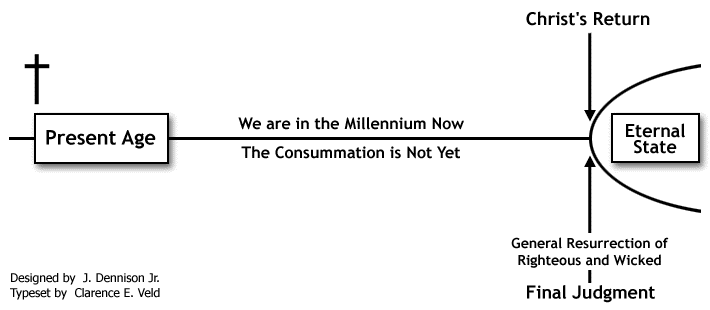
Amillennialism
Despite his error, Augustine can be credited for calling Millennialism what it is; carnal. In an article titled “Augustine on Revelation 20: A Root of Amillennialism” (Reformed) Professor of Systematic Theology, Ethics and Apologetics David McKay writes,
“Initially Augustine was attracted to the premillennial position: ‘I also entertained this notion at one time’. He came to feel repulsed, however, by the crass materialism of ‘the most unrestrained material feasts’ said to be enjoyed by the saints, together with quantities of drink ‘that will also exceed the limits even of incredibility.’ Augustine became convinced that the SPIRITUAL interpretation of prophecy was the correct approach and, rather than refute the premillennial view of those he termed ‘Chiliasts’ and ‘Millennarians’ in detail, he chose to set out the positive position which he believed to be sound.” -augustine-on-revelation-20-a-root-of-amillennialism/” Affinity.org.uk
Millennialism and Zionism in the Reformation
OK, jumping forward to the 16th century, the Reformers rightly understood Christ’s reign as spiritual, and unsurprisingly, they saw the oppressive Pope as the antichrist of Revelation. But the Jesuit Counter-Reformation’s infiltration and splintering of Protestantism included Jesuit monk Ribera’s “Futurist” timeline, which pushed the prophecies in the book of Daniel forward to the time directly preceding the second coming of Christ in order to take the focus off the Pope. This coincided neatly with the Jews anticipation of a Messiah who was yet to come. And with the sacking of Jerusalem by the Ottomans in 1516, there arose a fresh interest in the Jews returning to Jerusalem and anticipation of a coming utopian age held by nearly every great world religion.
“Despite Calvin’s antipathy to millennialism, some English Puritans, who represent a type of Calvinism, were leaning toward Premillennialism even before Calvin’s death. Some of this millennial interest was sparked by a different interpretation of Romans 11. Neither Calvin nor Luther understood this chapter to promise a future wholesale conversion of the Jews. However, Bucer and Peter Martyr (both close to Calvin), and Theodore Beza (Calvin’s successor), all taught that the nation of the Jews would be “joined to the church of Christ” prior to the end. Since Bucer taught at Cambridge and Martyr at Oxford, their influence was considerable.” – John Hesselink, The Millennium in the Reformed Tradition
Thomas Brightman: Postmillennialism and Zionism Restorationism
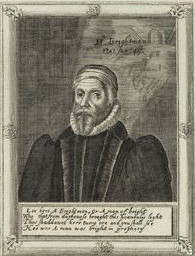
OK, here’s an interesting guy. Optimist, Post-Millennial Puritan Scholar / Theologian Thomas Brightman (1562–1607), was one of the first progenitors of the Zionist project. In 1615 his work Shall They Return to Jerusalem Again? was published, advocating the return of the Jews to the Holy Land. In his piece “Lord Balfour and His Zionist Declaration in 1917,” British scholar Philip Alexander notes,
“The origins of this idea [Christian Zionism or Jewish Restorationism] can be traced back to Elizabethan England. Indeed, and this is a point to note, it seems to be a thoroughly English phenomenon.[!*] Its earliest exponent was Thomas Brightman (1562–1607) in his influential work on biblical prophecy Apocalypsis Apocalypseos, first published posthumously in 1609. It was taken up by Sir Henry Finch in The World’s Great Restauration, or Calling of the Jews, and with them of all Nations and Kingdoms of the Earth to the Faith of Christ, published in 1621… Restorationism gained considerable traction among the Puritans in the seventeenth century. –Source
According to William M. Lamont, Brightman and Joseph Mede were the two most important revisionists of the interpretation and eschatology set down by John Foxe (source) Brightman’s ideas were condemned by the most branches of Protestantism as evidenced in the Augsburg Confession. Dr. Andrew Crome writes in his article “Seventeenth Century English Millennialism.”
“During the early years of the Reformation, the majority of English writers shared the general antipathy towards millennialism evident in both Lutheran and Reformed branches of Protestantism on the continent, adopting an Augustinian scepticism towards millennialism. Following the lead of the 1530 Augsburg Confession, the Forty-Two Articles of the Church of England (1553) concluded that those ‘that go about to renew the fable of heretics called Millenarii be repugnant to Holy Scripture and cast themselves headlong into Jewish dotage’ (Article XLI)…
Millennialism was linked in the mainstream Reformation with the bloodshed, communism, and polygamy of the 1533–1535 Anabaptist rising in the German city of Münster (Driedger 2018).” – Seventeenth Century English Millennialism, Dr. Andrew Crome
Building Israel’s Utopian kingdom
Another excerpt from Deanne Loper’s book,
“Little by little, one footstep at a time, we are witnessing the gradual transformation of the Gospel with the central focus and position of Jesus Christ in Scripture slowly being replaced by another gospel, another spirit, another Jesus, and another kingdom. Like Rabbi Higger, Rabbi Itzhak Shapira places earthly Jerusalem, along with the sacrificial system of the old covenant, front and center in his kingdom eschatology… Higger’s rabbinic conception of an ideal society, as outlined in the Babylonian Talmud and Kabbalah, is a call for the complete destruction of those individuals and nations who will not assist in the “upbuilding” of a utopian kingdom in Israel; namely Esau and Edom, Christianity and Islam.” – Deanne Loper, Kabbalah Secrets Christians need to know
New Millennial Views Arise Within Protestantism
For certain individuals whose condemnation was written about long ago have secretly slipped in among you. They are ungodly people, who pervert the grace of our God […] and deny Jesus Christ our only Sovereign and Lord. – (Jude 4)
Postmillennialism
In my last article, I discussed how the chief eschatological view among the Puritans was optimistic (“Enlightened”/ liberal) Postmillennialism (the optimistic belief that the spread of Christian principles would create a gradual progression toward the establishment of a golden age on earth before Christ’s return). I showed how these ideas were based in occult Enlightenment thought. Together with Restorationism, Postmillennialism saw America leading the world to a time of earthly peace, knowledge and understanding resulting from the spread of the Puritan Christian ethic, hence providing the framework to further secularize the gospel.

Scholars will point to four types of Postmillennialism, but the differences between them are negligible. All are concerned with bettering the world by the widespread acceptance of Christian principles, the “pessimistic” branch anticipating a few challenges during the final years. Christian Reconstructionist Postmillennialism , held by Modern Dominionists / NAR’s Seven Mountain Mandate emphasizes the need for Christians to actively engage in that transformation. Welcome to Christian Progressivism and the Social Gospel.
Interestingly, within Postmillennial Puritan writings, we also find the Premillennial anticipation of the Jews recognizing Jesus as the Messiah and eventually embracing Christianity. Ie. The Calling of the Jews (William Gouge, 1621) (Source)
To review, in my last article I talked about how this carnal hope of Christians creating a better world aligns with:
- RCC / Mystery School’s quest to rule the world
- The Alchemist vision portrayed in Francis Bacon’s New Atlantis
- Freemason Manly P. Hall’s America’s Secret Destiny
- Rosicrucian hopes of a better world
- The Jew’s belief that Messiah would come and reign from earthly Jerusalem
Again, in contrast are Jesus’ Words.
My kingdom is not of this world. (Jn 18:36)
Premillennialism
The 19th century saw many pivotal events, one of them being the revival of Premillennialism. In contrast to Postmillennialism, Premillennialism presents a world that will become increasingly evil culminating in a 7-year period of tribulation. This period is followed by a Futurist hope that Christ will victoriously return to set up His earthly kingdom and rule on earth for 1000 years in a strikingly Jewish Utopia. In answer to the Postmillennial hopes of bettering the world, Premillennialists offered a secret rapture to basically get them out of here before things get too bad.
Because of their decidedly pessimistic view, the original Premillennial Methodists / Pentecostals were criticized as being Fatalistic.
Now, since Dispensational Premillennialists focus on the future, they tend to rightly place spiritual matters over social issues. It seems counterintuitive that they represent a significant force in modern Christian Progressivism and view social justice as a reflection of Christian compassion. We can attribute this to Freemasonry working its carnality into all of Protestantism.
Like Postmillennialism, Premillennialism has its subgroups. Here’s a brief breakdown:
Historical Premillennialism , holds that the world will become increasingly evil with an increased persecution of the saints until the 1000 years of peace on earth begin at Christ’s second coming. During this “millennial reign,” Satan is to be bound and the saints will rule in a literal kingdom on earth with Christ sitting on the throne of David. After that, Satan will briefly be released to once again deceive the nations (that part always gets me: So I’m saved and I’m finally resting and reigning with Jesus, but then satan gets a second chance to deceive me?) 🤨 Anyway, then the end comes, judgment, a new heaven and earth are created.
Dispensational Premillennialism adds a seven-year period of tribulation to Historical Premillennialism, with either a; “pre, mid, or post” “secret rapture” of the church and salvation of all bloodline Jews preceding the millennium period. Although Dispensational Premillennialism did not have a strong following until the early 20th century, it has become the prevalent view.
Dispensationalism gave birth to the apocalypse cults; Mormonism, Jehovah’s Witnesses, Seventh-Day-Adventism, and Pentecostalism. Thanks to the notorious Cyrus Scofield, Dallas Theological Seminary’s Lewis Chafer of and others, with its pronounced focus on Israel in Bible prophecy (Zionism), Dispensationalism, is the predominant view held by Christians today. Until ten years ago the “Pre, Mid, or Post” argument was the only one I’d ever heard in regard to eschatology. If you want to read more, Dr Cathy Burns of Liberty to the Captives has written extensively about Dispensationalism.
Edwards’ and Wesley’s Dual Millennialism
Many Premillennialists hold to a Dual Reign; the idea that Christ as currently spiritually ruling in the hearts of men, but they also anticipate a future 1000 years when He will come to rule physically as well. Jonathan Edwards and John Wesley held to this view and it’s what I was taught in church.
The Dual Millennium concept allowed for both the Postmillennialist hope of a great advancement of the gospel complete with the conversion of the Jews, and the earthly reign of Christ from an earthly Jerusalem dreamed by early church Premillennialists.
The Dual Millennial belief was likely rooted in the writings of German bible scholar Johann Albrecht Bengel (1687-1752). Wesley acknowledged Bengel in his Preface to the Notes, referring to him as “that great light of the Christian world.” Pastor/Theologian Sam Storms writes,
“According to Bengel, the first millennium will be after the binding of Satan which then will allow for a dramatic spread of the Gospel throughout the world… Bengel’s second millennium was to be the earthly reign of Christ and the rejuvenation of creation akin to a return to Paradise… Bengel saw both millenniums mentioned in Revelation 20.” –Sam Storms.org
According to Wikipedia, Bengel “devoted himself especially to the works of Aristotle and Spinoza.” (Wikipedia) But I mean…
“Before entering into his new duties he travelled through the greater part of Germany, studying the systems of education which were in use, and visiting the seminaries of the Jesuits as well as those of the Lutheran and Reformed churches.” (ibid)
Honestly, it’s become tiresome to research these influencers, because literally, without exception, the “wisdom” of these “learned” highly-esteemed leaders of Protestantism comes from occult sources!
Clearly reflecting Bengal’s view, Wesley wrote of Revelation 20 in his Notes that,
“[It] must be observed, that two distinct thousand years are mentioned throughout this whole passage.”
Again, Wesley is recognized as one of the foremost Social Reformers of the 18th century. He looked toward a period of great revival before God fulfills His kingdom on earth.
Betraying the same sources, Edwards believed that the Great Awakening of the 1730s and 1740s was the prelude to, or possible beginning of the millennial reign of Christ on earth. (source) Like the Old Covenant Jews, Edwards saw America as a chosen people with a hope for deliverance in the earthly future. Seeing Americans as having a corporate identity, he helped cultivate the seeds of the Christian Nationalism. As The Imaginative Conservative writer Gordon Arnold writes,
“Edwards, as heir to the [Enlightened, Alchemical, Rosicrucian, Freemasonic] Puritan tradition, viewed America much as John Winthrop did—a “City Upon a Hill” for all the world to see. Edwards believed that God had engaged himself with New England to carry forth the end of the age. As Edwards explained in his Thoughts on the Revival:
“This new world is probably now discovered, that the new and most glorious state of God’s church on earth might commence there; that God might in it begin a new world in a spiritual respect, when he creates the new heavens and new earth…’
– TheImaginativeConservative.org
I can’t help but wonder what he’d think of America’s condition today. 🤔 Oh yea, he’d be blaming America’s ills on the people for their “sin” and screaming that they repent. 🙄
Anyway, true to our theme, Postmillennialism Premillennialism and Dual Millennialism all place the Christian’s focus on this carnal world.
The New “Gatekeeper View”
With the rise of “truth” seekers on the internet, a third, what I’ll call Gatekeeper View is now surfacing Exposing Zionist Dispensationalism. And while it is certainly helpful to learn about the nefarious creation of Zionism, this view once again leads to a carnal “activist” viewpoint. It’s easily recognized by its call-to-action, giving people the false idea that we can “change this.” We most certainly cannot. This view serves to fuel the uprising of the “false light” that’s needed to accomplish their goals. Here’s an example from a group calling themselves “Stop World Control.”
Confused yet? Well, keep this in mind.
For God is not the author of confusion but of peace… (1 Cor 14:33)
Dear Christian, the Gospel is simple, His commandment simple, and the simple bottom line is that this world is not our home. Any and all focus on it for current or future hope is a misdirection from our true hope. And our true hope is this; That Jesus, the precious Lamb of God who took upon Himself all our sin and has promised to walk with us through all our days until we finally meet Him face to face.
And they said, ‘Believe in the Lord Jesus, and you will be saved, you and your household.’ (Acts 16:31)
A new commandment I give to you, that you love one another: just as I have loved you, you also are to love one another. (Jn 13:34)
By faith [Abraham] dwelt in the land of promise as in a foreign country, dwelling in tents with Isaac and Jacob, the heirs with him of the same promise; for he waited for the city which has foundations, whose builder and maker is God. (Heb 11:9-10)
And the world passeth away, and the lust thereof: but he that doeth the will of God abideth for ever. (1 John 2:17)
But the day of the Lord will come as a thief in the night; in the which the heavens shall pass away with a great noise, and the elements shall melt with fervent heat, the earth also and the works that are therin shall be burned up.
Seeing then that all these things shall be dissolved, what manner of persons ought ye to be in all holy conversation and godliness. (2 Pet 3:10-11)
Next I’ll be looking at some of the surprising ways that Mystery School Enlightenment thought found its way onto American soil and into Protestantism.
Revivals Pt1 – Asbury: Let’s Talk About Revivals
Revivals Pt2 – Enlightenment in the Land of the Plumed Serpent
Revivals Pt3 – Mystery Schools, The RCC and the Reformation
Revivals Pt4 – The First Great Awakening & The Enigmatic George Whitefield
Revivals Pt5 – The Brimstone and Mysticism of Jonathan Edwards
Revivals Pt 6 – John Wesley (1 of 2) – The Mystery School Dialectic and Christian Mysticism
Revivals Pt 7 – John Wesley (2 of 2) More Mystics & Papal Doctrines of Men
Revivals Pt8 – From Wesley to Finney By Way of Count Zinzendorf
Revivals Pt9 – Charles Grandison Finney, Freemasonic Moralism and Modern Evangelicalism
Revivals Pt10 – The Pagan “Virus“
Revivals Pt11 – The Third Great Awakening: Pentecostalism!
Revivals Pt12 – Pentecostalism Pt2: The Founders of Pentecostalism
Revivals Pt 13 – Social Justice Pt 1 – They Don’t Mix
Revivals Pt 14 – Social Justice Pt 2 – A City Upon A Hill
Revivals Pt 15 – Christ in You vs Millennialism
Revivals Pt 16 – The Counterfeit Enlightenment Pt 1
Revivals Pt 17 – The Counterfeit “Enlightenment” Pt2: The Dark Ages and Golden Age of Islam
Revivals Pt 18 – The Counterfeit “Enlightenment” Pt 3: Islam In the Bible?
Revivals Pt 20 – The Counterfeit “Enlightenment” Pt5: Placing Man Upon An Esoteric Sphere
Revivals Pt21 – The Counterfeit “Enlightenment” Pt6: The Image of the Beast
Revivals Pt22 – Crowning the Lord of the Earth: The Cosmati Pavement
Revivals Pt24 – The Great American Mythos Pt2: A Whole New Mystically Enlightened World
Revivals Pt25 – Creating the American Mythos – Christopher Columbus: The Great American Hero Pt1
Revivals Pt 26 – Christopher Columbus Pt 2 – The Namesake Goddess of a “Christian” Nation
Revivals Pt27 – The Witchcraft of Numbers
Revivals Conclusion Pt2 – What Is The Gospel?
Revivals Conclusion Pt3 – Subversion – From Revivalists to Modern Times



